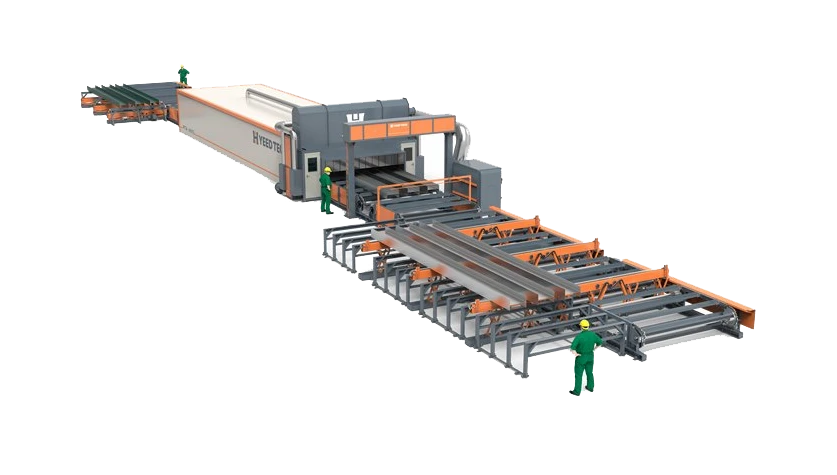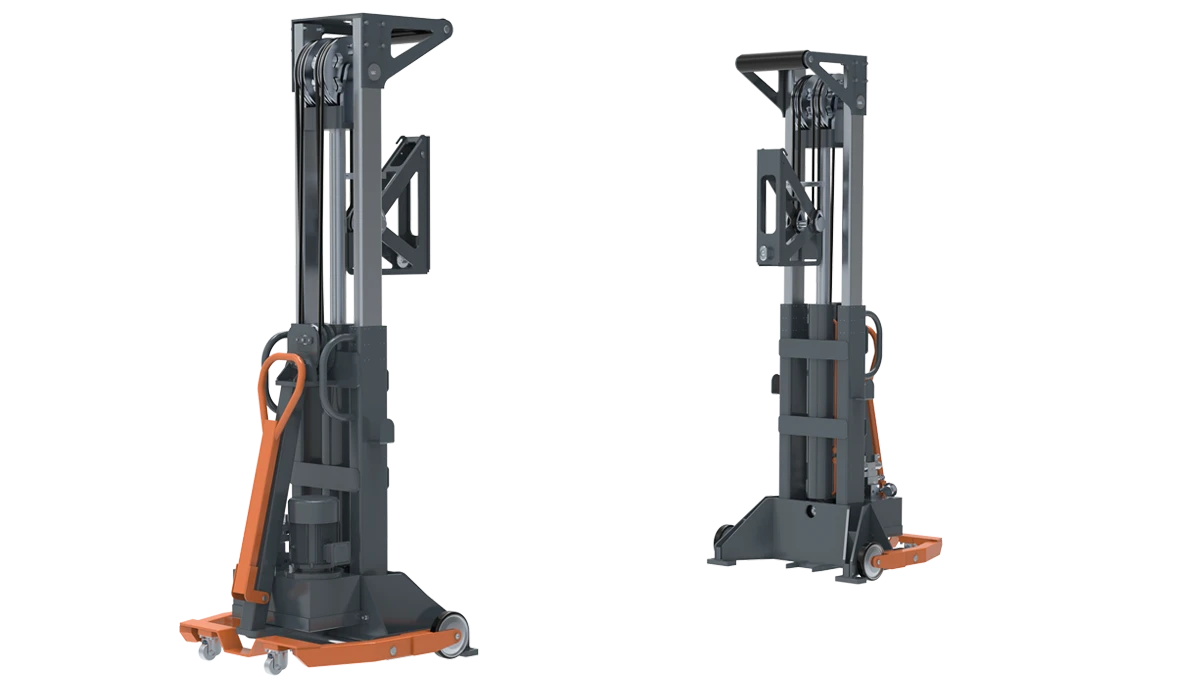
- Afrikaans
- Albanian
- Amharic
- Arabic
- Armenian
- Azerbaijani
- Basque
- Belarusian
- Bengali
- Bosnian
- Bulgarian
- Catalan
- Cebuano
- China
- China (Taiwan)
- Corsican
- Croatian
- Czech
- Danish
- Dutch
- English
- Esperanto
- Estonian
- Finnish
- French
- Frisian
- Galician
- Georgian
- German
- Greek
- Gujarati
- Haitian Creole
- hausa
- hawaiian
- Hebrew
- Hindi
- Miao
- Hungarian
- Icelandic
- igbo
- Indonesian
- irish
- Italian
- Japanese
- Javanese
- Kannada
- kazakh
- Khmer
- Rwandese
- Korean
- Kurdish
- Kyrgyz
- Lao
- Latin
- Latvian
- Lithuanian
- Luxembourgish
- Macedonian
- Malgashi
- Malay
- Malayalam
- Maltese
- Maori
- Marathi
- Mongolian
- Myanmar
- Nepali
- Norwegian
- Norwegian
- Occitan
- Pashto
- Persian
- Polish
- Portuguese
- Punjabi
- Romanian
- Russian
- Samoan
- Scottish Gaelic
- Serbian
- Sesotho
- Shona
- Sindhi
- Sinhala
- Slovak
- Slovenian
- Somali
- Spanish
- Sundanese
- Swahili
- Swedish
- Tagalog
- Tajik
- Tamil
- Tatar
- Telugu
- Thai
- Turkish
- Turkmen
- Ukrainian
- Urdu
- Uighur
- Uzbek
- Vietnamese
- Welsh
- Bantu
- Yiddish
- Yoruba
Premium Welding Boom Arm - AI-Powered Support Solution
As stricter global regulations on occupational health and environmental protection drive rapid transformation in industrial welding, welding boom arm technology is at the forefront for ensuring safe, efficient, and sustainable operations. This in-depth analysis explores the evolution, technical advantages, and future prospects of the welding boom arm—with a specific focus on Welding Fume Extraction Arm—and related welding air filtration systems, welding gas extractor solutions, and pricing benchmarks for welding fume extraction arms.
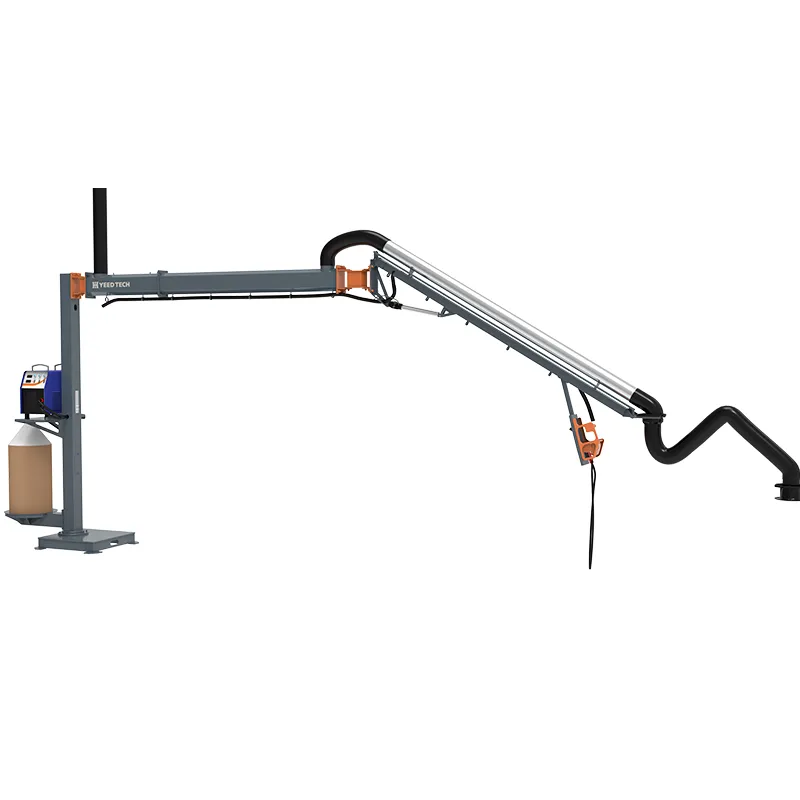
- Global Growth: The global welding fume extraction equipment market was valued at $1.27 billion in 2022, and is expected to reach $1.96 billion by 2028 (CAGR 7.2%), driven by increased health & safety investments in manufacturing.
- Regulatory Momentum: ISO 15012, OSHA, and EN 60335-2-69 set higher standards for fume extraction, accelerating adoption of innovative welding air filtration systems.
- Application Expansion: welding boom arm systems now serve across oil & gas, petrochemical, shipbuilding, metallurgy, water treatment, and boost productivity through localized fume removal and ergonomic design.
| Feature | welding boom arm | Welding Air Filtration Systems | Welding Gas Extractor |
|---|---|---|---|
| Typical Reach Length | 2-8 meters | Integrated/standalone (site-dependent) | Fixed/Mobile—2-4 meters |
| Extraction Capacity | 650–2800 m³/h | Up to 8000 m³/h | 500–2200 m³/h |
| Arm Swing Radius | 270°–360° | – | 120°–180° |
| Filtration Efficiency | ≥ 99.8% | Up to 99.97% | Up to 96% |
| No. of Install Points | Wall, ceiling, portable stand | Centralized or distributed | Local extraction |
| Price Range (USD) | $480–$1,800 2024 Q2 | $1900–$12,000 | $350–$1,300 |
| Typical Maintenance | Low—external joints, seals | Medium—filters, sensors | Low/Medium—motor, hoses |
The welding boom arm, specifically the Welding Fume Extraction Arm, is engineered to directly capture and filter welding fumes and airborne contaminants at source, ensuring a safe working environment and compliance with global safety standards.
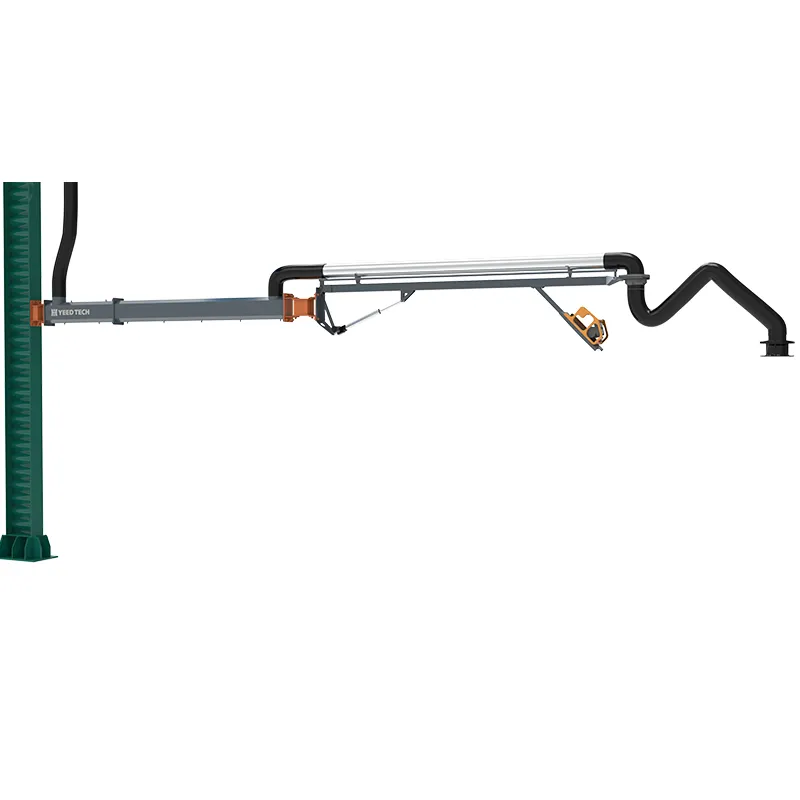
- Arm Structure: Multi-segment aluminum tubes, internal stainless-steel support springs, and external gas-assisted balancing for smooth positioning.
- Extraction Hood: Wide capture area, 360° rotatable with adjustable wind direction plate.
- Installation Flexibility: Wall-mount, ceiling-mount, and mobile stand options for maximum adaptability.
- Filtration System: High-efficiency PTFE HEPA filters, multi-stage pre-filtration, and optional activated carbon for VOCs.
- International Certifications: ISO 15012 (Welding Fume Control), CE, RoHS, ANSI Z49.1 standard compliant.
(6061-T6, 7075-T73)
Cutting, Drilling, Finishing
Precision Joint/Seal
ISO/ANSI Standards
Anodizing, Epoxy Coating
Shockproof, Moisture-proof
- Raw Material Traceability: Each batch of alloy is logged with heat number for ISO 9001 compliance.
- In-Process Testing: Welds are 100% inspected using dye penetrant or radiographic NDT as per EN ISO 5817 “Welding - Fusion-welded joints in steel, nickel, titanium and their alloys.”
- Robust Surface Coating: Epoxy finish passes ASTM B117 salt spray test for >1000 hours (anti-corrosion rating C4).
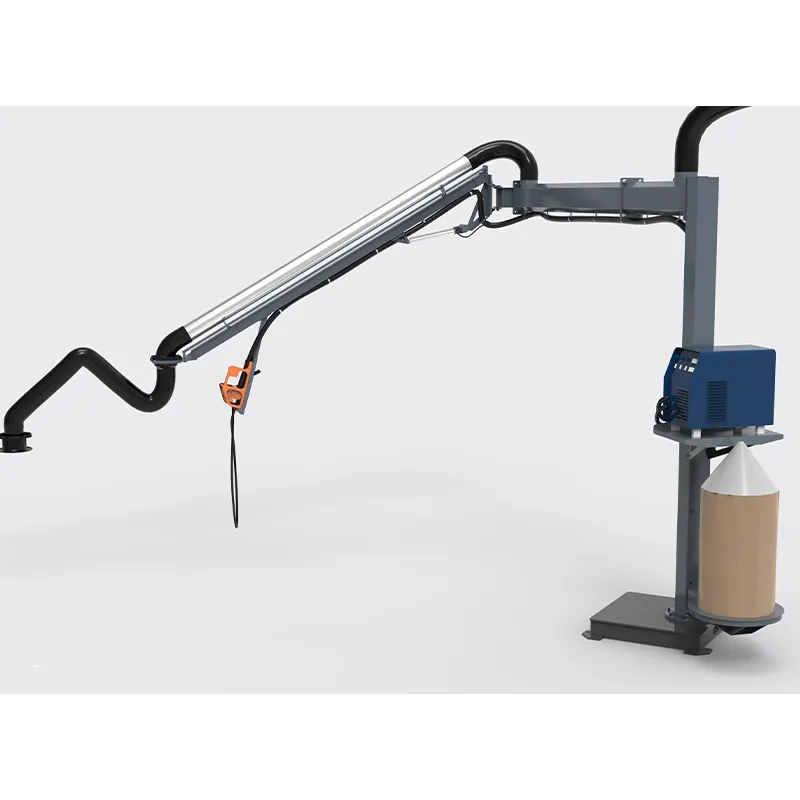
| Model | Arm Length (m) | Extraction Flow (m³/h) | Diameter (mm) | Material | Filtration Efficiency | Operating Pressure (Pa) | Certifications |
|---|---|---|---|---|---|---|---|
| WFA-2000 | 2.0 | 1200 | 160 | 6061-T6 Alu Alloy | 99.8% | 1500 | ISO/CE/ANSI |
| WFA-3000 | 3.0 | 1800 | 160/200 | 7075-T73 Alu Alloy | 99.9% | 1700 | ISO/CE/ANSI |
| WFA-4000 | 4.0 | 2200 | 200 | Alu+Stainless | 99.94% | 2100 | ISO/RoHS/ANSI |
- Petrochemical Plants: High-volume welding boom arm systems efficiently extract fumes from tank welding and pipe joints, preventing explosive gas accumulation.
- Shipbuilding Yards: Extra-long arms (up to 8m) reach confined ship hulls, maintaining air quality without obstructing large-scale assembly lines.
- Steel Mills & Foundries: Withstand high temperatures and abrasive dust; anti-corrosive coating extends lifespan by 30% vs. uncoated products. (Reference)
In 2023, a leading water treatment equipment supplier in Germany upgraded to 32 sets of Welding Fume Extraction Arms for their welding stations, reducing airborne particle concentration by 97%—well below EU Directives (max. 3 mg/m³ for respirable dusts). After 6 months, worker absenteeism from respiratory symptoms fell by 48%, and annual filter maintenance expenses dropped by 28% versus the previous mobile welding gas extractor units.
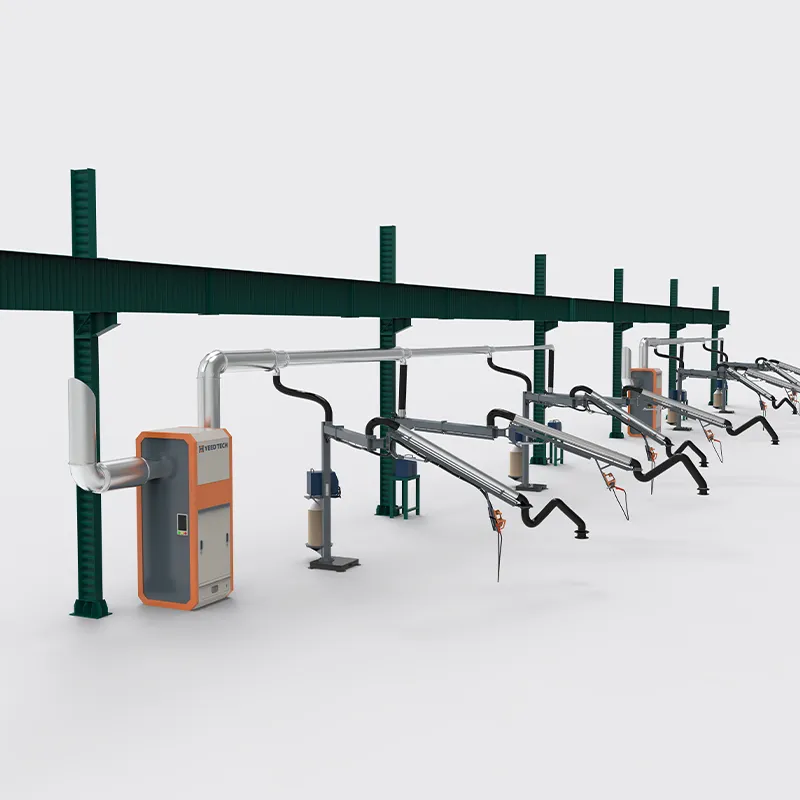
| Brand | Certifications | Min/Max Arm Length (m) | Filtration Specs | Warranty | Custom Design? |
|---|---|---|---|---|---|
| YEEEED | ISO, CE, ANSI, RoHS | 2–8 | HEPA, ≥99.97% | 3 yrs | Yes |
| KEMPER | ISO, W3, EN 60335-2-69 | 1.5–6.5 | PTFE, H13 | 2 yrs | Partial |
| Nederman | CE, ISO | 2–7 | Polyester, 98.5% | 2 yrs | Yes |
| Plymovent | RoHS, CE, UL | 1.5–4 | E12 HEPA | 1 yr | Customizable |
- Unique Edge: YEEEED’s Welding Fume Extraction Arm features CNC-processed tube connectors and triple-sealed rotary joints, surpassing EN ISO 15012-1:2020 airflow safety requirements.
- After-sales Services: Extended warranty, rapid parts delivery, and technical customization are deciding factors for enterprises with strict uptime standards.
- ROI Calculations: Reduced filter replacement frequency and service costs lower three-year ownership outlay by 22% versus industry averages cited by AWS (American Welding Society).
- Site-Specific Sizing: Boom arm length, pivot radius, and extraction flow rate tailored to match station size, ceiling height, and weld location density.
- Material Upgrades: For corrosive or high-temperature environments: stainless steel, specialized PTFE gaskets, and reinforced flexible hoses (tested to ISO 3864 for chemical resistance).
- Integration: Arms pair with centralized welding air filtration systems, dust sensors, and smart monitoring via Modbus/PLC.
- Accessory Options: Integrated LED lighting, spark arresters, and anti-static components for hazardous (ATEX/EX) locations.
- Consultation & On-site Analysis: Free air quality audit and fume dispersion mapping; software simulations for airflow optimization.
- Design Proposal: Technical drawing submission (DWG/STEP), equipment list, compliant with OSHA and ISO norms.
- Production & Inspection: All welding boom arm units undergo 72-hr continuous operation test and leakproofness validation.
- Delivery & Installation: Site preassembly kits, plug & play connectors, quick-guide manuals for rapid deployment.
- Commissioning & Staff Training: Hands-on operation training, filter maintenance schedule, digital asset documentation.
- Feedback from European Automotive OEM: “After the installation of YEEEED’s welding boom arm solution, our on-site PM2.5 readings during two-shift operation dropped from 7.9 mg/m³ to 1.4 mg/m³, well within EN 689 occupational exposure limits. Noise levels also decreased by 5 dB due to optimized airflow design.”
- Asia-Pacific Metalwork Client: “Switching from portable welding gas extractor units to advanced extraction arms resulted in a 63% reduction in consumable filter costs and 12% faster workpiece turnover due to reduced operator intervention.”
- Professional Service: YEEEED’s technical support is on call 24/7, with a mean response time of 2 hours on urgent ticket submissions (SLA records, 2023).
Warranty: 36 months on structural and mechanical components, 1 year on filters/consumables.
Customer Support: Dedicated technical specialist (Get Support), on-site installation and maintenance, remote troubleshooting via AR/VR on request.
Compliance Guarantee: All products are supplied with full QC/factory inspection records, performance test sheets, and EU/US Declaration of Conformity.
- Q1. What are typical materials used for welding boom arm construction?
- Primarily aerospace-grade aluminum (6061-T6, 7075-series) for arm bodies due to their high strength-to-weight ratio, with stainless steel for pivot/joint assemblies and PTFE/viton gaskets for long-term chemical resistance.
- Q2. How do I select the correct specification for my welding air filtration system?
- Evaluate your station size, number of simultaneous welding points, fume concentration, and ceiling height. Opt for flow rates of 1200–2000 m³/h per arm for dense smoke environments and 2-4 meter arm length for flexibility.
- Q3. What certifications should a welding fume extraction arm carry?
- ISO 15012 for welding fume extraction, ANSI Z49.1, CE for EU safety standards, RoHS for electrical safety, and EN 60335-2-69 for commercial filtration appliances.
- Q4. What is the average service life of a high-quality welding boom arm?
- 9–13 years under 8-hour daily operation, subject to annual inspection and replacement of consumable items (seals, filters).
- Q5. Are there standard installation dimensions or best practice guidelines?
- Yes, EN ISO 15012-4 recommends 180°–270° pivot radius, minimum 1.5 meter end hood clearance for optimal capture velocity (>0.5 m/s), and periodic airflow validation with calibrated anemometers.
- Q6. Can a welding boom arm be installed in ATEX hazardous zones?
- With upgrades: anti-static coatings, grounding kits, and explosion-proof fans as per IEC/ATEX standards; ensure all moving joints pass ISO 80079-36/37 risk assessment.
- Q7. What is the average welding fume extraction arm price?
- $500–$1,800 for standard units in 2024; price varies by brand, reach, airflow, filtration class, and compliance with enhanced standards (HEPA/H14/H13, ATEX, remote monitoring).
As industrial demands and regulatory scrutiny rise, the welding boom arm will remain the gold standard for localized fume extraction, energy efficiency, and worker safety. Manufacturers like YEEEED are pushing the envelope with smarter, more robust designs and integration with intelligent monitoring. As cited in recent issues of Welding Journal and the AWS Welding Forum, investment in source-capture arms is among the highest ROI steps for compliance and health.
References: AWS Welding Forum | Welding Journal—ScienceDirect | YEEEED Welding Fume Extraction Arm
Products Categories
Latest News
-
Unmatched Mobility and Efficiency in Container Handling Equipment
NewsJun.26,2025 -
Streamlined Approaches and Equipment for Container Handling
NewsJun.26,2025 -
Revolutionizing Cargo Management: Solutions for ISO Container Handling
NewsJun.26,2025 -
Equipment Insights: Revolutionizing Container Handling Operations
NewsJun.26,2025 -
Critical Components for Efficient Shipping Container Handling
NewsJun.26,2025 -
Advanced Equipment and Systems for Efficient Container Storage and Handling
NewsJun.26,2025 -
Unrivaled Components in Structural Engineering Solutions
NewsMay.28,2025



